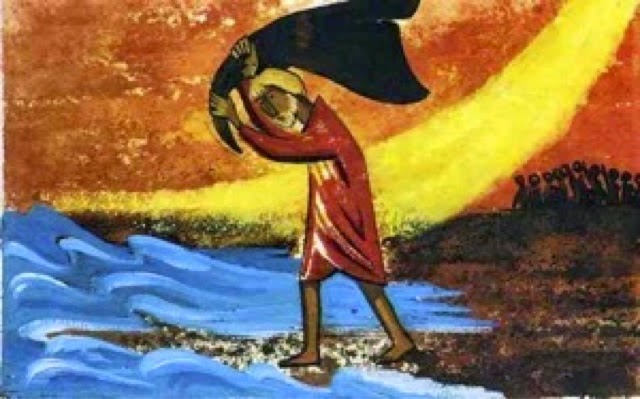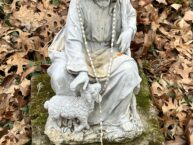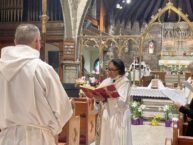 February 11, 2024: Arise, shine! For your light has come, and the glory of the Lord has risen upon you. Amen.
February 11, 2024: Arise, shine! For your light has come, and the glory of the Lord has risen upon you. Amen.
This is a busy day in the Episcopal Church.
It is World Mission Sunday, which is always on the last Sunday of Epiphany. It is a time when the church comes together to focus on the global impact of our baptismal call to “seek and serve Christ in all persons.” Later today is also the diocesan service honoring Absalom Jones, the first African American to be ordained a priest in the Episcopal Church. His story of enslavement, perseverance, faith and justice work is remembered and honored on the Sunday prior to his saint day of February 13th.
And so it is good that today, with these two things in mind, we hear the story of the transfiguration of our Lord on the mountaintop, and of Elijah passing on his mantle to Elisha. Because the church, the world, all of us, are in need of transfiguring, and we have been passed the mantle of the work we are called to do now in our time.
In the gospel, Jesus tapped Peter, James, and John to go on a field trip up the mountain. They get up there and Jesus gets lit up like a Superbowl stadium at halftime – which, by the way, is yet another thing happening today. Anyway, Jesus isn’t alone. He seems to be having a conference with two other big stars of biblical fame – Elijah and Moses. The three of them standing there chatting away.
Now, I don’t know about you, but I sure would have loved to have been able to eavesdrop on that conversation – I mean, what the heck were they talking about. Perhaps they were taking bets on who will win – the Chiefs, the Niners, Taylor Swift, or the commercials. Whatever it was, we never get to know, nor do Peter & the Sons of Thunder (great band name, right?).
And then Peter decides he has to do something. No – he doesn’t take a selfie (he probably left his phone back in his tent – but dang that would’ve been some insta post, right?). Out of fear, the text says, he suggests building tents for Jesus, Elijah, and Moses up there on the mountain. God tells him to just listen to Jesus, who after the other two disappeared, leads the disciples back down the mountain.
Holy smokes what a great script for a Hollywood movie. But wait, here’s another one!
There is the story of the prophet Elijah and his protege Elisha. Elijah, as we heard today, was nearing the end of his life – he knew it, and so did Elisha. At every turn, Elijah offered his disciple an off-ramp – a way to avoid having to follow in Elijah’s footsteps. And at ever turn, Elisha refuses. Finally, after they had crossed the Jordan, Elijah says to his younger charge, “Tell me what I may do for you, before I am taken from you.” Elisha said, “Please let me inherit a double share of your spirit.”
Now, you have to wonder about that request, right? What exactly does that mean? I mean, maybe Elisha should have asked for something practical, like, I don’t know, a rule book, or a compass for all those crazy desert crossings, or a maybe a top 10 list of things no wandering prophet should ever do, right? But instead, he tells Elijah “Make mine a double!,” and in this very request, he is showing that he has learned something very important about this prophet work.
You see – prophets do not do the work themselves. Elisha knew that if he were to carry this work on, he needed to have the spirit that Elijah had, even doubly so (showing his humility in the presence of his mentor) – a spirit that would enable him to be open to being used by God for work in the world.
And then, when Elijah was taken up to God in what can only be described as the most fabulously Hollywood dramatic display of fire in almost a space-age version of the chariot race from Ben Hur, Elisha saw that Elijah’s mantle, his cloak of sorts, was left behind, and he picked it up – the transition was complete, and the journey was now Elisha’s alone.
These are two amazing biblical narratives. I mean, Elijah should win the Oscar for Best Dramatic Exit for flying up into the heavens in a fiery horse drawn chariot. And the transfiguration – Jesus, Elijah, and Moses lighting up like a Christmas tree on fire is mind blowing too. But let’s not get lost in the extravaganza and lose sight of what these stories are telling us about our faith, and our life – especially as we remember blessed Absalom Jones and World Mission Sunday.
But what could that message for us be? What are we to learn from these biblical narratives and that of Absalom Jones? What does any of it have to do with World Mission Sunday? Let’s take a step back and consider the news of today.
This past week, I was asked to sit in for our bishop on a House of Bishop’s call regarding the situation in Gaza. The speaker was The Rev. Fadi Diab, who serves as rector of St. Andrew’s Church in Ramallah and St. Peter’s Church in Birzeit in the West Bank. In addition to his parish responsibilities, he has multiple roles in the Episcopal Diocese of Jerusalem, including serving on the board of the Al-Ahli Arab Hospital in Gaza (which has been bombed, and has seen overwhelming tragedy), and as chaplain of St. Philip’s Church, which is on the hospital compound. And, Fr. Diab happens to be the one to write the sermon for World Mission Sunday offered by The Episcopal Church. (A link to this sermon is included at the end of this post)
He described on that call, and in his sermon, what life is like there now. “Tens of thousands have been killed and injured—70% of them women and children. Two million have been displaced. Entire neighborhoods have been leveled to the ground. Entire families have been wiped from the civil registry. Gaza has been described by UN officials as “a graveyard for children,” and “a living hell for everyone else.” And then he adds this: “What has been even more distressing to the Palestinian Christian community is the utter silence, even indifference, of the majority in the international church.”
The horror he described to us on that Zoom meeting left my heart broken. Even while we know this latest genocide began in response to the horrific attack by Hamas where women were sexually assaulted, children killed, and hostages taken, we also know that the complete destruction of a people is not the answer, nor is the persecution in Gaza something new, just something escalated beyond imagination. Political solutions may be complicated, but injustice is not – no matter who is doing it, or who the victims may be.
In the case of Absalom Jones, much of the church not only remained silent in the face of slavery, but in his case, literally turned their backs on him and those who had joined the parish because of his evangelism. History may say they left St. George’s, but the truth is – the church left them. And while we are blessed that he continued in his prophetic work, later ordained a priest in the Diocese of Pennsylvania, that by no means absolved the church, then or now, for standing silent in the face of injustice, and especially for participating in it.
In these transfiguration moments – these pivotal crossroads in our faith, both in our past and today – the church as a whole has not always made the right choice. We have sometimes sought refuge on the mountaintop. We have turned aside from the prophets of our age when there was an easier path to choose. We have even said “well, the church shouldn’t be political.” As though the suffering of a child of God could be called political. It is not political.
Yet as Fr. Diab wrote in his sermon for today, “As the Holy Land goes through what seems like an endless night, the church is called to engage, not retreat. To help transform pain into hope and oppression into liberation…Such a transfiguration mission requires that the church overcome neutrality, fear, self-centeredness, and carelessness. It entails engaging the messiest conditions and conflicts; it involves getting our hands dirty. It encompasses an indispensable action to dismantle systems of injustice and oppression. It believes that there is no sphere into which the church may not speak or cannot engage. It entails a prophetic denunciation of everything that seeks to undo God’s dream for God’s world. And yes, it anticipates criticism, repudiation, pain, and death for the sake of God’s mission.”
I believe blessed Absalom Jones would agree and add “let the people say Amen!”
Folks, this is no time for the church to be silent!
No, we must pick up the mantle given us in our baptism, and cross the Jordan to be the prophetic witnesses God has called us to be.
We must not allow ourselves the comfort of our personal experience of Jesus, but look inward at our complicity in systems of injustice, and atone for our sins, make amendment of our lives, and take action in the world.
Our work as followers of Jesus, as prophetic witnesses of God’s love for everyone – no exceptions – is not easy work.
Being a follower of Jesus means stepping into a journey where the cross looms as a possibility. You see, whenever we do the work of Christ – whenever we truly follow Him – we do not stand idlily by – we are not silent. We will do the things he did.
We will overturn the tables of hate.
We will stand with the suffering.
We will resist, persist, and enlist others in our cause of love.
And that, my friends, really annoys those who have power. Jesus knew that. Jesus knew what lay ahead for him once they descended down that mountain. Jesus was going to do what he came to do, the things we are called to do as his followers – and he knew the cost may be his life.
So here we are – a people amidst the rise of violent racism here in our country, genocide in Gaza, antisemitism around the world.
And having experienced the transfigured Christ in his real presence among us in the Eucharist, we stand at the crossroads of prophetic witness or safety as we leave our churches on Sunday mornings.
We are called to come down from the mountaintop, to not choose what is comfortable, but tread the righteous path!
We are meant to not only follow Christ, but to ask for a double share of his humility, his grace, his love – not for ourselves, but as a mantle to be worn in our work in his name!
And, we are doing some of that work across the church now, using our voice, our witness, our treasure to bring about the beloved community God dreams for us all. Like prophetic work has always been throughout time – it is for each of those who follow Jesus a life long journey – with hills and valleys – progress and setbacks. Yet we will not grow weary – we will not hide on the mountaintop – we will not choose to go another way.
Not while children of God are being slaughtered in the Middle East, in Ukraine, in our streets, at our borders because of the color of their skin, the faith they profess, for being female, because of who they love, what language they speak, and what gender they claim.
We, the church, followers of Jesus, will not be silent.
We will take on the mantle of Christ, pray for a double share of his humility, boldly leave our proverbial mountaintops and cross whatever rivers we must to speak the truth.
The truth that everyone is made in the image of God – everyone is God’s beloved child.
And, we will not be silent, we will not stand on the sidelines, when any of God’s beloved is harmed, nor will we turn our back on any part of God’s creation.
This we will do.
This we must do.
May God grant us all a double share of the Holy Spirit to equip us for the work we are to do in the name of Jesus, that all may come to live in love not fear, peace and not war.
Amen.
For the audio, click below, or subscribe to our iTunes Sermon Podcast by clicking here (also available on Audible):
Fr. Diab’s sermon for World Mission Sunday: https://www.episcopalchurch.org/ministries/global-partnerships/world-mission-sunday/?mc_cid=a87322c206&mc_eid=4975198647
The Rev. Diana L. Wilcox
Christ Church in Bloomfield & Glen Ridge
February 11, 2024
Last Sunday After the Epiphany
1st Reading – 2 Kings 2:1-12
2nd Reading – 2 Corinthians 4:3-6
Gospel – Mark 9:2-9






